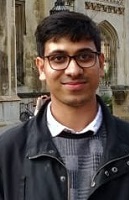Animesh Jain aj584@cam.ac.uk
India
Department of Engineering, Clare Hall
PhD thesis: Indirect Noise in Non-Isentropic Flows
Research interests
1. Aircraft Propulsion
2. Fluid Dynamics
3. Machine Learning
4. Optimal Design
During his PhD, Animesh studied one of the most intractable and persistent challenges in rocket and aircraft-engine development with a completely new approach: Prediction and control of thermoacoustic instability by exploiting symmetries.
Air transportation is anticipated to double over the next couple of decades, which calls for novel methods to cut back on up to 80% in oxides of nitrogen (NOx) and up to 50% in noise, as set by the Advisory Council for Aerospace Research. To develop new clean aircraft engines, gas turbines are designed to burn in a lean regime to reduce NOx emissions. The downside is that lean flames burn very unsteadily because they are sensitive to the turbulent environment of the combustion chamber. In this complex multi-physical environment, the sound waves interact with the flame to generate violent thermoacoustic oscillations. These oscillations cause structural damage, fatigue, cracking, resulting in the reduction of the combustor lifetime by a factor of two or more. If not controlled, they can be catastrophic for the engine operability and safety. On the one hand, all of these phenomena are unwanted and have to be eliminated during the design or controlled if they occur. On the other hand, these phenomena are bound to increase as turbines become cleaner. These two contrasting situations make the design of low-emission aircraft engines particularly challenging. Animesh's project proposed a new framework to predict and thermoacoustic oscillations by exploiting the symmetries of the aeroengines combustors, in which the flames are arranged in an annular configuration. The project imported methods from quantum mechanics (such as parity-time symmetries) and group theory into software for optimal design. With a better design, the new aircraft engine will be cleaner, healthier and quieter, keeping the design, repair and replacement costs low.
Following the completion of his PhD, Animesh has begun working as a Desk Quantitative Analyst at the Royal bank of Canada, in London.
Who or what inspired you to pursue your research interests?
I was inspired to pursue my research interests by the idea of sustainable development. I have always aimed to work for pollution reduction. I chose to be vegetarian to reduce my carbon footprint. All my previous projects were also based around the idea of making technologies greener and reducing amount of pollutants. Moreover, fluid dynamics has always intrigued me as it finds application in most of the aspects of our existence for instance fluids flow inside our body, aircraft propulsion etc. Modern fluid dynamics was born in Cambridge (Newton, Rayleigh, Stokes, Lighthill, Taylor, Batchelor, and many many others) and Cambridge leads fluid-dynamics worldwide. I am grateful to Harding Distinguished Scholarship Programme to give me an opportunity to work in the best available intellectual environment towards my aim of contributing as much as I can in making technologies greener.

